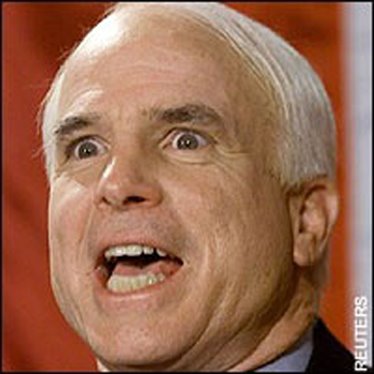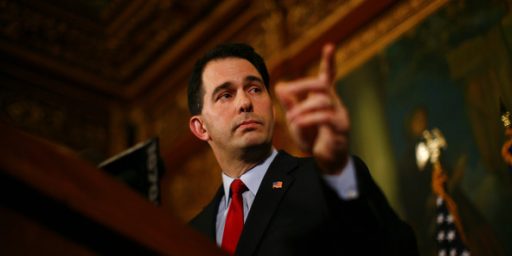McCain Tangled in Campaign Finance Web
 John McCain appears to be caught in the campaign finance system that he championed.
John McCain appears to be caught in the campaign finance system that he championed.
The nation’s top federal election official told Sen. John McCain yesterday that he cannot immediately withdraw from the presidential public financing system as he had requested, a decision that threatens to dramatically restrict his spending until the general election campaign begins in the fall.
The prospect of being financially hamstrung by the very fundraising system he helped create is the latest in a series of bitter challenges for the presumed GOP nominee, who still faces a fractured conservative coalition as he assumes the mantle of party leadership.
There’s a certain delicious irony in this, especially enjoyable by those of us who opposed McCain’s efforts at “reforming” away the rights of citizens to spend their own money as they see fit on political speech.
It sounds, though, like McCain is merely caught in a technicality owing to vacancies on the FEC and that he would be well within his rights to have his withdrawal granted were there a quorum.
McCain’s attempts to build up his campaign coffers before a general election contest appeared to be threatened by the stern warning yesterday from Federal Election Commission Chairman David M. Mason, a Republican. Mason notified McCain that the commission had not granted his Feb. 6 request to withdraw from the presidential public financing system.
The implications of that could be dramatic. Last year, when McCain’s campaign was starved for cash, he applied to join the financing system to gain access to millions of dollars in federal matching money. He was also permitted to use his FEC certification to bypass the time-consuming process of gathering signatures to get his name on the ballot in several states, including Ohio.
By signing up for matching money, McCain agreed to adhere to strict state-by-state spending limits and an overall limit on spending of $54 million for the primary season, which lasts until the party’s nominating convention in September. The general election has a separate public financing arrangement.
But after McCain won a series of early contests and the campaign found its financial footing, his lawyer wrote to the FEC requesting to back out of the program — which is permitted for candidates who have not yet received any federal money and who have not used the promise of federal funding as collateral for borrowing money.
Mason’s letter raises two issues as the basis for his position. One is that the six-member commission lacks a quorum, with four vacancies because of a Senate deadlock over President Bush’s nominees for the seats. Mason said the FEC would need to vote on McCain’s request to leave the system, which is not possible without a quorum. Until that can happen, the candidate will have to remain within the system, he said.
The second issue is more complicated. It involves a $1 million loan McCain obtained from a Bethesda bank in January. The bank was worried about his ability to repay the loan if he exited the federal financing program and started to lose in the primary race. McCain promised the bank that, if that happened, he would reapply for matching money and offer those as collateral for the loan. While McCain’s aides have argued that the campaign was careful to make sure that they technically complied with the rules, Mason indicated that the question needs further FEC review.
If the FEC refuses McCain’s request to leave the system, his campaign could be bound by a potentially debilitating spending limit until he formally accepts his party’s nomination. His campaign has already spent $49 million, federal reports show. Knowingly violating the spending limit is a criminal offense that could put McCain at risk of stiff fines and up to five years in prison.
“If in fact he is stuck with these spending limits, it would be a serious limitation on what he can do,” said Rick Hasen, an election law expert at Loyola Law School in Los Angeles. Finance experts compared the situation to the massive imbalance faced by Republican presidential nominee Robert J. Dole in 1996, when he was forced to contend with spending limits while his opponent, President Bill Clinton, was not.
Trevor Potter, a former FEC chairman who is McCain’s top lawyer, immediately disputed the assertions in Mason’s letter, saying McCain has a constitutional right to exit the federal program. He also dismissed the letter as unenforceable because the FEC lacks a quorum to resolve the dispute. “We believe that Senator McCain had a clear legal right to withdraw from the primary matching fund system, and he has done so,” Potter told the Associated Press. “No FEC action was or is required for withdrawal.”
Campaign finance experts were split on how serious the FEC position could become. But several agreed that the matter would not be resolved by McCain simply ignoring the letter and plowing ahead. “It’s nice for Trevor Potter to say ‘Buzz off,’ but the campaign is going to have to respond,” said Bradley Smith, a former FEC chairman. “This is serious,” agreed Republican election lawyer Jan Baran. Ignoring the matter on the grounds that the FEC lacks a quorum, Baran said, “is like saying you’re going to break into houses because the sheriff is out of town.”
The Congress has been deadlocked in partisan games for well over a year in confirming people to a bipartisan commission. One can’t imagine that Senate Democrats will be eager to break that if it means their presidential candidate, already presumed to be the favorite to win, will have a decided financial edge.
Photo credit: Mike Kuykendall





I wonder what McCain thinks of his legislation now?
If it isn’t resolved soon, it may backfire on the democrats though. Sure holding out gives their candidate an edge, but without some really good reasons for not seating the nominations, it will make them look petty and like they are cheating. Something I would think Obama would want to avoid.
McCain’s hypocrisy is long-standing. Mr. Straight Talk, of course decried special interests while his wife was investing in questionable land deals during the Savings and Loan crisis.
He also has embraced indicted Congressman Rick Renzi who is a leader in his presidential campaign. Renzi is accused of extortion and also engaging in money laundering. The fact that he has an indicted felon as his close adviser should raise questions about his self-appointed role as a reformer.